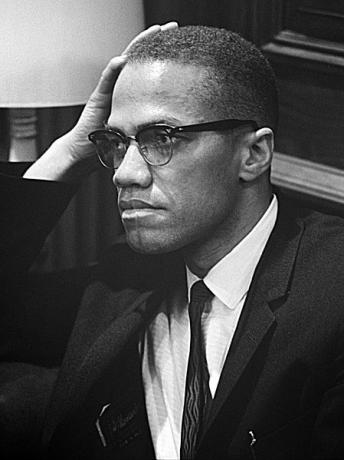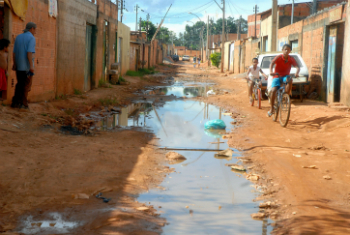The concept of social minority it concerns, in the social sciences, a portion of the population that is somehow marginalized, that is, excluded from the socialization process. These are groups that, in general, are composed of a large number of people (in most cases, they are the absolute majority in numbers), but which are excluded for reasons related to social class, gender, sexual orientation, ethnic origin, the presence of special needs, among other reasons.
Read too: Alterity - recognition of different cultures and subjectivities
minority groups
Contemporary capitalist societies tend to develop certain standardselitists to categorize what is “normal”. There is a standard of living sold as the best, in addition to a standard of behavior that is socially regarded as the norm. This is called a standardization. Minorities are social sectors that are fleeing from the different norms imposed and, as contradictory as it may seem, they are the majority in absolute numbers.
O capitalism it sells the idea that anyone who does not meet the system's normative classification has no value, is a reduced being. Interestingly, normative standards serve as a way of maintaining the
ruling class hegemony. The normative standard of excellence in this system is maintained by white people, with high remnants of a misogynistic system, from the middle to the upper class, heterosexuals, considered productive, etc.
Minority groups, in this area of normative standards, are many. There is a search for the representation of these groups in the scenario of domination. Below is a listing of some of these groups.
ethnic minorities
Ethnic groups that deviate from the standardized denomination generally take a life away from the protagonism of power systems, whether they are political, intellectual or financial. The ethnic hegemonies of power, despite being widespread with the growth of capitalism, were first established in the modern world with the intercontinental displacement of Europeans and the consequent colonization of other territories outside the Europe. The Europeans tried to dominate the territories and, with that, use the form of racist ideological domination: put the other (ethnicity other than white) as inferior.
Here in Brazil, we can highlight, mainly, black and indigenous ethnic minorities.
Indigenous
![Indigenous peoples are ethnic minorities in Brazil and the Americas. [1]](/f/7921020a8641324579b8fa8532a6dc83.jpg)
Historical inhabitants of pre-colonial Brazil, the Indians were the owners of the land we inhabit today. The Portuguese arrived here and, in order to exploit the land's riches, began a long and intense process of decimation of the indigenous ethnic groups. Today the Indians are an absolute minority in numbers and also a social minority.
The Indians no longer have the material conditions to maintain their traditional way of life (based on tribal life and subsistence through hunting and fishing). Society grew and pushed on the Indians who still resist in the villages the way of life they call “civilized”. In this process, many indigenous people and descendants (mestizos or not) were assimilated into white culture. Although, this ethnic minority remains far from power spaces.
Do not stop now... There's more after the advertising ;)
See too: Indigenous culture - an important part of Brazilian culture rejected by ethnocentrism
black
the blacks, from the African continent, were taken around the world between the 16th and 19th centuries to be enslaved. This left sequelae in the formation of societies on all continents outside the Africa (racism, discrimination and marginalization of the black population) and left the misery brought about by domination and for colonialism within the European continent. This, of course, led to the construction of societies that left blacks outside the mechanisms of power.
national minorities
National minorities are minority groups that develop, often because of ethnicity, within state political systems that exclude certain groups. We can consider that Brazilian indigenous peoples are a kind of ethnic minority that developed on the margins, but they are not a national minority. Just as Jews were in Europe before the Nazism (with remnants, still are), national minorities are peoples relegated to the neglect of States for not being recognized as citizens of that State.
National minorities share ethnicity, culture, religion and customs of a particular place. You peoplesgypsies are national minorities in some European countries, as well as the Basque peopless they are minorities in Italy, Spain and France. As with the aforementioned Jews, national minorities are made up of peoples who do not fit into a country's culture and are not recognized as part of that nation's culture as civil citizens in its entirety. The Basques and Jews (before the creation of the State of Israel for Jews) are nationalities without a country, without a territory.
THE creation of the State of Israel, curiously committed to solving the problem of the Jews, created a new national minority: the Palestinians, who live in Israel (and have lived there before) and are not included in that country's formulation.
low-income population
All over the world, especially in capitalist countries, but not non-existent in socialist countries, The low-income population represents a large part of social minorities. In the case of Brazil, people who live with low income and, in the worst and most numerous cases, in absolute misery (people below the poverty line) are majority in numbers. Politics and power spaces are designed for the rich all over the world. No matter how small the social differences in one place or another, there will always be poverty as long as economic systems are maintained as they are.
The masses of poor populations live badly around the world, especially in developing countries. They are hungry, do not have access to decent and necessary food to maintain a healthy life, do not have access to basic sanitation, do not have access to culture and education. In addition to the current problem related to poverty, there is a poverty maintenance problem. The poor are not given real chances to overcome their condition of life, except for rare exceptions or a really huge effort by those who find themselves in the miserable situation.
It is relatively easy for a child from the middle or upper class, with good nutrition and with a good basic education to succeed professionally and financially. For a child from the lower class who does not have adequate food, who does not have basic sanitation at home, who shares a small, hot and cramped house with the rest of the family and who do not have access to a good basic education and culture, the task of being financially successful becomes almost a job. unreachable.
Apparently, the best ways to solve misery are cash transfer programs to solve the emerging problem of hunger and poverty. housing, in addition to investment in basic infrastructure (sanitation) and, in particular (and in the long term), investment in public education and quality.
Also access: Human Rights - category of basic rights guaranteed to all human beings
Social minorities and the fight for rights
As much as there is social exclusion - by social class, color, gender or sexuality -, there is also reaction to this deletion. It is in this sense that the social movementsis, important tools in the fight against exclusion and in favor of the distribution of power among all people. At the case of blacks, for example, we have historical social movements that fought against the racism and in favor of the insertion of the black population in the power systems in Brazil. Initially, we had in the 19th century the abolitionist movement Brazilian, which involved blacks, browns and whites who defended the total end of slavery in the country.
In the 20th century, other movements and collectives emerged that aimed at ending racism and inserting black people into the world with equal opportunities. THE anti-racism law and quota law are examples of important achievements of these movements in contemporary Brazil.

speaking of gender issue, women have historically been excluded from power scenarios in the world for a long time (and even today, to a lesser extent in many countries, but still existing). A historic social movement in the fight against misogyny and in favor of gender equality was the feminist movement. There are, however, several feminist movements from different times or even coexisting in the same historical moments. These differences in movements take into account other aspects that represent the concept of minority in other situations, such as social class and ethnicity.
The first feminist ideals rose up against the misogynist oppression of patriarchy in the passage of eighteenth to the nineteenth century and resulted in the first major movement in the passage from the nineteenth century to the century XX. it was about the movement sufragista, which aimed to guarantee the right to vote and female participation in the political environment. The movement was transforming and branching out, and in the 20th century, a group emerged that claimed the right to sexual freedom and branches that defend specific causes, such as that of black women.
In relation to sexuality, we have the formation of a social minority around the world, the LGBTQ communityIA+,community formed by homosexuals, bisexuals, transsexuals and people who identify in a non-binary way with the gender. This population, also historically excluded in most western and eastern countries for rooted reasons, mainly in religious and moral factors, it is still strongly excluded from spaces of power and acceptance Social.
As backward as it may seem, 70 countries around the world still criminalize homosexuality; 26 of them punish the act with imprisonment for up to 10 years; and 6 of them punish homosexuality with the death penaltyi|1|. You movementsLGBTQIA+ around the world are examples of focus of struggle against the exclusion of these populations.
In relation to issues of economic and social exclusion, we have social movements that fight against inequality and poverty. An example of this type of movement in Brazil is the Landless Workers Movement (MST) and the Homeless Workers Movement (MTST), who fight for the land reform and for the guarantee of housing for all.
Image credits
[1] José Cruz/ABr / commons
by Francisco Porfirio
sociology professor


